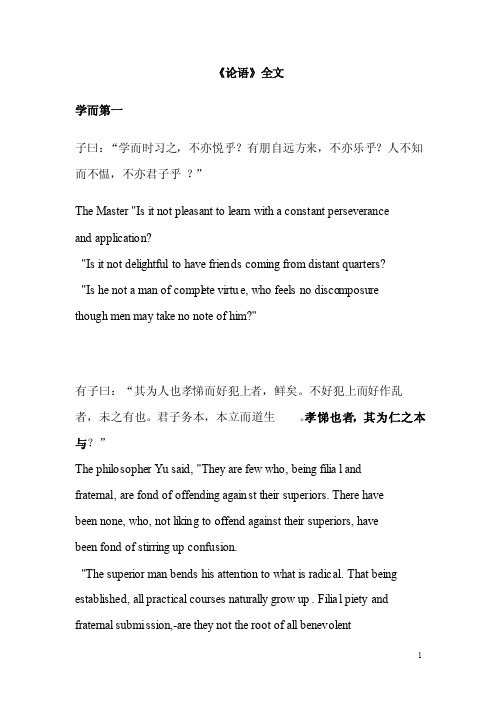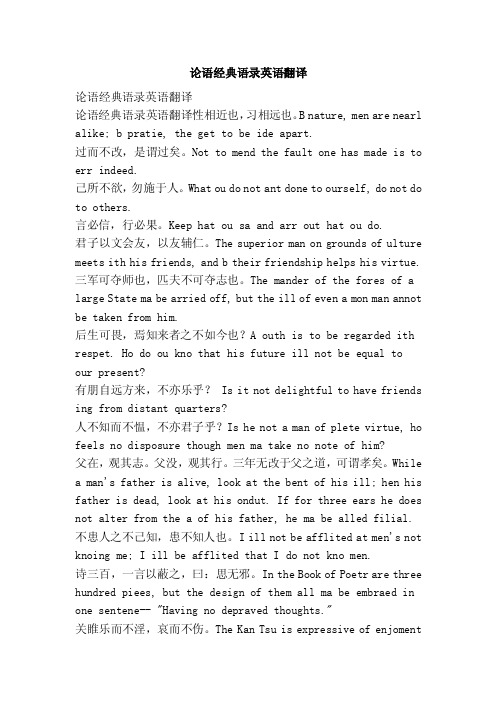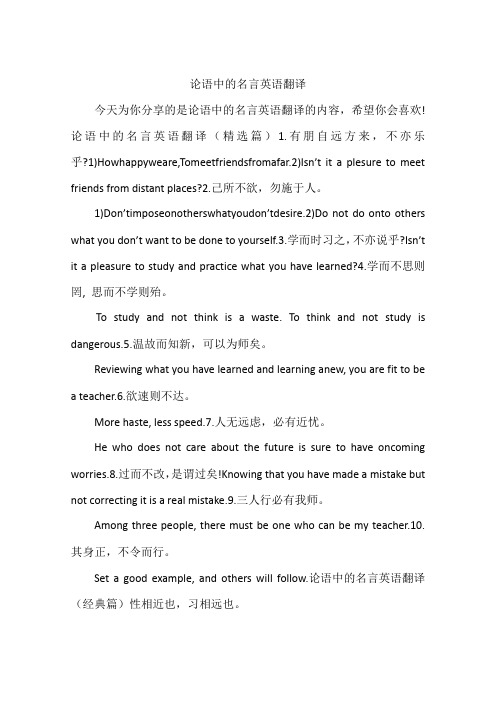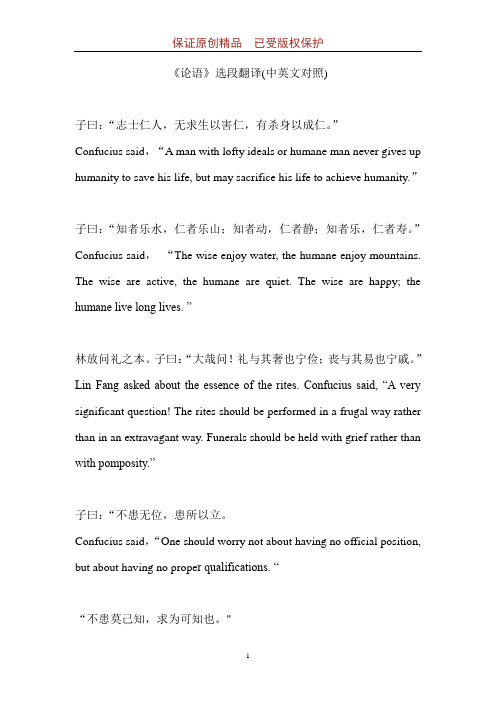论语精选一百句(中英文对照-英文摘自1914年哈佛版)
《论语》名句英文选译

《论语》名句英文选译(1)--《学而》1.1学而时习之,不亦悦乎?有朋自远方来,不亦乐乎?人不知而不愠,不亦君子乎?The master said, to learn and at due times to repeat what one has learnt, is that not after all a pleasure? that friends should come to one from afar, is this not after all delightful? to remain unsoured envn though one's merits are unrecognized by others, is that not after all what is expected of a gentleman?(我最喜欢最后这句,也希望能够自勉,虽然这是在太难了,谁能够“不食人间烟火”呢?)1.2 巧言令色,鲜矣仁。
The master said, "clever talk and a pretentious manner" are seldom found in the Good.(真的是“人不可貌相”,路遥知马力,日久见人心,人心隔肚皮。
)1.3 吾日三省吾身。
为人谋,而不忠乎?与朋友交,而不信乎?传,不习乎?Every day I examine myself on these three points: in acting on behalf of others, have I always been loyal to their interests? In intercourse with my friends, have i always been true to my word? Have i failed to repeat the precepts that have been handed down to me?(反省能力也许是人类的优势和优点,反省是进步提高的关键,三省甚至五省,每日必修课。
《论语》全文中英对照

《论语》全文学而第一子曰:“学而时习之,不亦悦乎?有朋自远方来,不亦乐乎?人不知而不愠,不亦君子乎?”The Master "Is it not pleasa nt to learnwith a consta nt persev eranc eand applic ation?"Is it not deligh tfulto have friend s coming from distan t quarte rs?"Is he not a man of comple te virtue, who feelsno discom posur ethough men may take no note of him?"有子曰:“其为人也孝悌而好犯上者,鲜矣。
不好犯上而好作乱者,未之有也。
君子务本,本立而道生。
孝悌也者,其为仁之本与?”The philos opher Yu said, "They are few who, beingfilial andfrater nal, are fond of offend ing agains t theirsuperi ors. Therehavebeen none, who, not liking to offend agains t theirsuperi ors, havebeen fond of stirri ng up confus ion."The superi or man bendshis attent ion to what is radica l. That beingestabl ished, all practi cal course s natura lly grow up. Filial pietyandfrater nal submis sion,-are they not the root of all benevo lentaction s?"子曰:“巧言令色,鲜矣仁。
论语经典语录英语翻译(范文)

论语经典语录英语翻译论语经典语录英语翻译论语经典语录英语翻译性相近也,习相远也。
B natur e, men a re nearl alike;b pratie, the ge t to beide apar t.过而不改,是谓过矣。
Not to mend the fau lt one h as madeis to er r indeed.己所不欲,勿施于人。
What ou do n ot ant d one to o urself,do not d o to oth ers.言必信,行必果。
Kee p hat ou sa andarr outhat ou d o.君子以文会友,以友辅仁。
T he super ior manon groun ds of ul ture mee ts ith h is frien ds, andb theirfriendsh ip helps his vir tue. 三军可夺师也,匹夫不可夺志也。
Themander o f the fo res of a large S tate mabe arrie d off, b ut the i ll of ev en a mon man ann ot be ta ken from him.后生可畏,焉知来者之不如今也?A o uth is t o be reg arded it h respet. Ho doou kno t hat hisfuture i ll not b e equalto our p resent?有朋自远方来,不亦乐乎? Isit not d elightfu l to hav e friend s ing fr om dista nt quart ers?人不知而不愠,不亦君子乎?Is henot a ma n of ple te virtu e, ho fe els no d isposure thoughmen ma t ake no n ote of h im?父在,观其志。
《论语》全文中英对照

《论语》全文学而第一子曰:“学而时习之,不亦悦乎?有朋自远方来,不亦乐乎?人不知而不愠,不亦君子乎?”The Master "Is it not pleasant to learn with a constant perseveranceand application?"Is it not delightful to have friends coming from distant quarters?"Is he not a man of complete virtue, who feels no discomposure though men may take no note of him?"有子曰:“其为人也孝悌而好犯上者,鲜矣。
不好犯上而好作乱者,未之有也。
君子务本,本立而道生。
孝悌也者,其为仁之本与?”The philosopher Yu said, "They are few who, being filial and fraternal, are fond of offending against their superiors. There havebeen none, who, not liking to offend against their superiors, havebeen fond of stirring up confusion."The superior man bends his attention to what is radical. That being established, all practical courses naturally grow up. Filial piety and fraternal submission,-are they not the root of all benevolent actions?"子曰:“巧言令色,鲜矣仁。
中英文对照版《论语》

中英文对照版《论语》性相近也,习相远也。
By nature,men are nearly alike;by practice, they get to be wide apart.过而不改,是谓过矣.Not to mend the fault one has made is to err indeed.己所不欲,勿施于人。
What you do not want done to yourself,do not do to others。
言必信,行必果。
Keep what you say and carry out what you do。
君子以文会友,以友辅仁。
The superior man on grounds of culture meets with his friends,and by their friendsh ip helps his virtue.三军可夺师也,匹夫不可夺志也。
The commander of the forces of a large State may be carried off, but the will of even a common man cannot be taken from him。
后生可畏,焉知来者之不如今也?A youth is to be regarded with respect。
How do you know that his future wi ll not be equal to our present?有朋自远方来,不亦乐乎?Is it not delightful to have friends coming from distant quarters?人不知而不愠,不亦君子乎?Is he not a man of complete virtue,who feels no discomposure though men may take no note of him?父在,观其志。
论语中的名言英语翻译

论语中的名言英语翻译今天为你分享的是论语中的名言英语翻译的内容,希望你会喜欢!论语中的名言英语翻译(精选篇)1.有朋自远方来,不亦乐乎?1)Howhappyweare,Tomeetfriendsfromafar.2)Isn’t it a plesure to meet friends from distant places?2.己所不欲,勿施于人。
1)Don’timposeonotherswhatyoudon’tdesire.2)Do not do onto others what you don’t want to be done to yourself.3.学而时习之,不亦说乎?Isn’t it a pleasure to study and practice what you have learned?4.学而不思则罔, 思而不学则殆。
To study and not think is a waste. To think and not study is dangerous.5.温故而知新,可以为师矣。
Reviewing what you have learned and learning anew, you are fit to be a teacher.6.欲速则不达。
More haste, less speed.7.人无远虑,必有近忧。
He who does not care about the future is sure to have oncoming worries.8.过而不改,是谓过矣!Knowing that you have made a mistake but not correcting it is a real mistake.9.三人行必有我师。
Among three people, there must be one who can be my teacher.10.其身正,不令而行。
《论语》选段翻译(中英文对照)

《论语》选段翻译(中英文对照)子曰:“志士仁人,无求生以害仁,有杀身以成仁。
”Confucius said,“A man with lofty ideals or humane man never gives up humanity to save his life, but may sacrifice his life to achieve humanity.”子曰:“知者乐水,仁者乐山;知者动,仁者静;知者乐,仁者寿。
”Confucius said,“The wise enjoy water, the humane enjoy mountains. The wise are active, the humane are quiet. The wise are happy; the humane live long lives. ”林放问礼之本。
子曰:“大哉问!礼与其奢也宁俭;丧与其易也宁戚。
”Lin Fang asked about the essence of the rites. Confucius said, “A very significant question! The rites should be performed in a frugal way rather than in an extravagant way. Funerals should be held with grief rather than with pomposity.”子曰:“不患无位,患所以立。
Confucius said,“One should worry not about having no official position, but about having no prope r qualifications. ““不患莫己知,求为可知也。
"”One should not seek to be known to others, but seek to acquire the qualities worthy of being known.”子曰:“人无远虑,必有近忧。
孔子语录英汉对照

孔子语录英汉对照第一篇:孔子语录英汉对照1.子曰:“学而时习之,不亦悦乎?有朋自远方来,不亦乐乎?人不知而不愠,不亦君子乎?”The Master said, “to learn and at due times to repeat what one has learned, is that not after all a pleasure? That friends should come to one from afar, is this not after all delightful? To remain unsoured even though one's merits are unrecognized by others, is that not after all what is expected of a gentleman?”2.子曰:“吾十有五而志于学,三十而立,四十而不惑,五十而知天命,六十而耳顺,七十而从心所欲,不逾矩。
”The Master said, “At fifteen I set my heart upon learning.At thirty, I planted my feet firm upon the ground.At forty, I no longer suffered from perplexities(困惑;窘困).At fifty, I knew what were the biddings(命令,吩咐)of Heaven.At sixty, I heard them with docile(驯顺的,驯良的)ear.At seventy, I could follow the dictates(听从...支配)of my own heart;for what I desired no longer overstepped(逾越)the boundaries of right.”3.子曰:“贤哉回也!一箪食,一瓢饮,在陋巷,人不堪其忧,回也不改其乐。
- 1、下载文档前请自行甄别文档内容的完整性,平台不提供额外的编辑、内容补充、找答案等附加服务。
- 2、"仅部分预览"的文档,不可在线预览部分如存在完整性等问题,可反馈申请退款(可完整预览的文档不适用该条件!)。
- 3、如文档侵犯您的权益,请联系客服反馈,我们会尽快为您处理(人工客服工作时间:9:00-18:30)。
論語精選一百句論語學而篇第一一、子曰:「學而時習之,不亦說乎?有朋自遠方來,不亦樂乎?人不知而不慍,不亦君子乎?」THE MASTER said: “In learning and straightway practising is there not pleasure also? When friends gather round from afar do we not rejoice? Whom lack of fame cannot vex is not he a gentleman?”二、子曰:「巧言令色,鮮矣仁。
」The Master said: “Honeyed words and flattering looks seldom speak of love.”三、子曰:「君子食無求飽,居無求安,敏於事而慎於言,就有道而正焉:可謂好學也已。
」The Master said: “A gentleman who is not a greedy eater, nor a lover of ease at home, who is earnest in deed and careful of speech, who seeks the righteous and profits by them, may be called fond of learning.”四、子曰:「不患人之不己知,患不知人也。
」The Master said: “Not to be known should not grieve you: grieve that ye know not men.”五、曾子曰:「吾日三省吾身:為人謀,而不忠乎?與朋友交,而不信乎?傳,不習乎?」Tseng-tzu said: “Thrice daily I ask myself: ‘Have I been unfaithful in dealing for others? Have I been untrue to friends? Do I practise what I preach?’”六、曾子曰:「慎終追遠,民德歸厚矣。
」Tseng-tzu said: “Respect death and recall forefathers, the good in men will again grow sturdy.”論語為政篇第二七、子曰:「詩三百,一言以蔽之,曰思無邪。
」The Master said: “To sum up the three hundred songs in a word, they are free from evil thought.”八、子曰:「為政以德。
譬如北辰,居其所,而眾星共之。
」THE MASTER said: “In governing, cleave togood; as the north star holds his place, and the multitude of stars r evolve upon him.”九、子曰:「吾十有五而志於學;三十而立;四十而不惑;五十而知天命;六十而耳順;七十而從心所欲,不踰矩。
」The Master said: “At fifteen, I was bent on study; at thirty, I could stand; at forty, doubts ceased; at fifty, I understood the laws of Heaven; at sixty, my ears obeyed me; at seventy, I could do as my heart lusted, and never swerve from right.”十、子游問孝。
子曰;「今之孝者,是謂能養。
至於犬馬,皆能有養。
不敬,何以別乎?」Tzu-yu asked the duty of a son.The Master said: “To-day a man is called dutiful if he keep his father and mother. But we keep both our dogs and horses, and unless we honour parents, is it not all one?”十一、子夏問孝。
子日:「色難。
有事,弟子服其勞,有酒食,先生饌,曾是以為孝乎?」Tzu-hsia asked the duty of a son.The Master said: “Our manner is the hard part. For the young to be a stay in toil, and leave the wine and cakes to their elders, i s this to fulfil their duty?”十二、子曰:「吾與回也終日,不違如愚。
退而省其私,亦足以發,回也,不愚!」The Master said: “If I talk all day to Hui, like a dullard, he never stops me. But when he is gone, if I pry into his life, I find he can do what I say. No, Hui is no dullard.”十三、子曰:「溫故而知新,可以為師矣。
」The Master said: “Who keeps the old akindle and adds new knowledge is fitted to be a teacher.”十四、子曰:「學而不思則罔,思而不學則殆。
」The Master said: “Study without thought is vain: thought without study is dangerous.”十五、子曰:「人而無信,不知其可也。
大車無輗,小車無軏,其何以行之哉?」The Master said: “Without truth I know not how man can live. A cart without a crosspole, a carriage without harness, how could they be moved?”十六、子曰:「非其鬼而祭之,諂也。
見義不為,無勇也。
」The Master said: “To worship the ghosts of strangers is fawning. To see the right and not do it is want of courage.”論語八佾篇第三十七、孔子謂季氏:「八佾舞於庭。
是可忍也,孰不可忍也!」OF the Chi having eight rows of dancers in his hall, Confucius said: “If this is to be borne, what is not to be borne?”十八、子曰:「人而不仁,如禮何?人而不仁,如樂何?」The Master said: “A man without love, what is courtesy to him? A man without love, what is music to him?”十九、子曰:「君子無所爭,必也射乎?揖讓而升,下而飲,其爭也君子。
」The Master said: “A gentleman has no rivalries-except perhaps in archery; and then, as bowing he joins the winners, or steps down to see the loser drink, throughout the struggle he is still the gentleman.”二十、子夏曰:「(巧笑倩兮。
美目盼兮,素以為絢兮),何謂也?」子日:「繪事後素。
」Tzu-hsia asked: “What is the meaning of:‘Her cunning smiles,Her dimples light,Her lovely eyes,So clear and bright,The ground, not yetWith colours dight’?”The Master said: “Colouring follows groundwork.”二十一、子入太廟,每事問。
或曰:「孰謂鄹人之子知禮乎?入太廟,每事問。
」子聞之曰:「是禮也!」On entering the Great Temple, the Master asked how each thing was done.One said: “Who says that the man of Tsou’s son has a knowledge of ceremony? On entering the Great Temple, he asked how each thing was done!”On hearing this, the Master said: “Such is the ceremony.論語里仁篇第四二十二、子曰:「富與貴,是人之所欲,不以其道得之,不處也。
貧與賤是人之所惡,不以其道得之,不去也。
君子去仁,惡乎成名?君子無終食之間違仁,造次必於是,顛沛必於是。
」The Master said: “Wealth and honours are w hat men desire; but abide not in them by help of wrong. Lowliness and want are hated of men; but forsake them not by help of wrong.“Shorn of love, is a gentleman worthy the name? Not for one moment may a gentleman sin against love; not in flurry and has te, nor yet in utter overthrow.”二十三、子曰:「里仁為美。
擇不處仁,焉得知?」THE MASTER said: “Love makes a spot beautiful: who chooses not to dwell in love, has he got wisdom?”二十四、子曰:「朝聞道,夕死可矣!」The Master said: “To learn the truth at daybreak and die at eve were enough.”二十五、子曰:「士志於道,而恥惡衣惡食者,未足與議也!」The Master said: “A scholar in search of truth who is ashamed of poor clothes and poor food it is idle talking to.”二十六、子曰:「見賢思齊焉,見不賢而內自省也。
